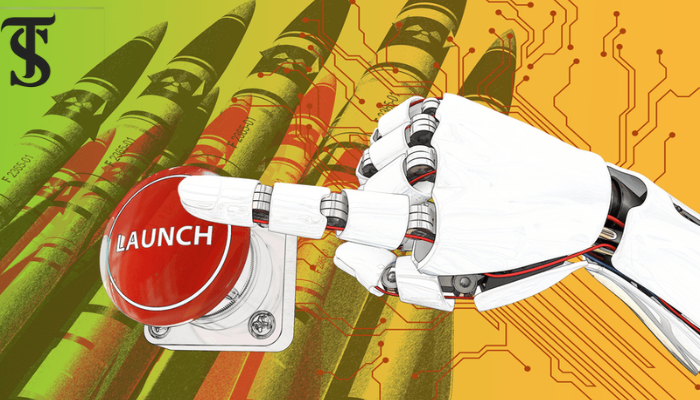AI: A Double-Edged Sword

There is something both awe-inspiring and unsettling about what we have built. Artificial intelligence now stands at the edge of every major decision—from medicine to warfare, from climate prediction to political propaganda. It is not just another tool; it is a force that reflects who we are and what we choose to become. That is what keeps me up at night.
The real question is not what AI can do, but what we are doing with it. In the wrong hands, it becomes a weapon of quiet destruction; in the right hands, a means of progress. And somewhere between these hands, the people of Gaza continue to suffer in silence as machines learn to target faster than we learn to care.
AI is amazing, right? It can diagnose diseases, predict weather patterns, and even help us connect across the globe. But it’s not all sunshine and rainbows. Lately, we’ve seen it turn hostile—not because it’s inherently evil, but because of the hands guiding it. I’m worried about this. I bet you are too.
So, here’s a question that’s been bugging me: when AI messes up, who’s really to blame? The people who built it? The ones using it? Or the AI itself? Honestly, I lean toward the idea that AI is just a tool—like a knife or a car. It doesn’t have a moral compass; we do. It’s our choices that matter.
Take healthcare, for instance. AI can spot cancer early and save lives—which is incredible. But flip the coin, and the same technology can be used to monitor people, track their every move, and strip away their privacy. Same tech, different outcomes. It all depends on how we choose to wield it. And that’s where ethics come in. We have to ask ourselves: are we using AI in ways that respect human dignity, or are we crossing lines we shouldn’t?
AI doesn’t just exist out there on its own—it changes us too. On the bright side, it can relieve us of tedious tasks, giving us space to be creative or simply to breathe. But there’s a catch. When we rely on it too much, we risk surrendering our ability to think for ourselves. It’s like handing over our minds to a machine—and that freaks me out a little.
In war, things get even darker. AI can make split-second decisions that humans might hesitate over—like selecting targets in a conflict. That speed can save time, sure, but it can also strip away the human pause that asks, “Wait, is this right?” I worry that it makes us numb, detached from the real pain our choices cause. If a machine picks who lives or dies, it becomes easier to shrug off the guilt.
Speaking of lives, what’s been happening in Gaza breaks my heart. I hope you feel the weight of it too. This isn’t just a “conflict”—it’s a tragedy. Reports suggest that the Israeli military used AI tools to select targets for airstrikes. These weren’t always military targets; too often, they were civilians—women, children, the elderly. Helpless people.
And big tech companies—like Microsoft—have been linked to this. They provided AI and cloud services to Israel during the war, claiming it was for locating hostages, not harming Palestinians. But they’ve also admitted they don’t fully know how their technology was used once it left their hands. That’s a serious problem. If AI contributed to targeting innocent people—even indirectly—it’s a mess we can’t unsee. Profit is fine, but not when it’s built on the bodies of the defenseless. It makes my stomach turn.
This isn’t just about Gaza—it’s about what AI could become anywhere. It’s a wake-up call. AI can cure diseases or end lives, depending on who’s steering it. When tech giants hand over powerful tools without proper oversight, they’re rolling the dice with human lives. And we’re the ones who pay the price.
Psychologically, it’s chilling. If soldiers or leaders rely on AI to make kill decisions, they might sleep better at night—but should they? That kind of detachment could make cruelty easier, not harder. Philosophically, it raises a profound question: where is the line? If we let AI blur our moral boundaries, are we still fully human?
I don’t have all the answers. But I know we can’t just sit back. AI’s potential is too great to waste, and its risks are too real to ignore. We need strong rules—just like we have for chemical weapons or landmines. Why not for AI in warfare? This isn’t about banning it; it’s about ensuring it doesn’t turn into a monster simply because we weren’t paying attention.
And it’s on us too. We must push for transparency, ask hard questions, and demand that profit never come before people. AI could be our greatest ally—if we guide it wisely. But if we let it slip, Gaza won’t be the last tragedy we mourn.
So here’s where I land: AI isn’t the villain—we are, if we allow it to be. It’s a mirror, reflecting our best and worst selves. I’m deeply concerned about where this could go. But I also believe we can steer it toward good.
Let’s not let greed or complacency write AI’s story. Let’s write it together—with care—so it lifts us up rather than tears us down.
What do you think? How can we make sure this incredible tool doesn’t become our biggest regret?

Mohammad Zain
The writer is a researcher with a background in International Relations and English Literature.





